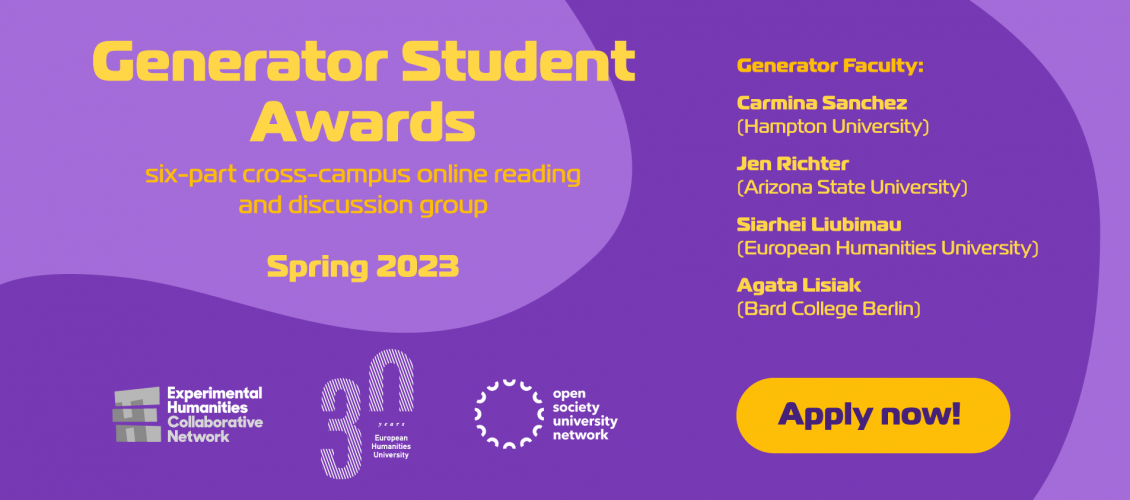The Generator Project builds on interdisciplinary expertise and experimental teaching and research methods to generate:
- awareness of concerns, values, and hopes across communities engaged with any aspect of energy systems, whether material or political, with different regional foci including Lithuania, Germany, Arizona, and Virginia
- rethinking prevalent notions of economic growth and productivity
- new relationships and networks of cross-cultural understandings of the flows of power, materially and politically
- understanding of historical legacies from the ways that energy systems and political power intersect including considerations of migration, nationalism, and globalization
- ideas for interventions inspired by the social justice work done by communities struggling with energy transitions
- new questions regarding social and environmental justice specific to participants’ geographical locations as well as globally
Thematically, we will focus our generative discussions and projects on: Cultures of Energy, Geographies and Temporalities of Responsibility, Speculative Imaginaries, and Energy Crises and Revolutions.
The Generator Project is supported by the Experimental Humanities Collaborative Network (EHCN), which supports innovative and interdisciplinary research at the intersection of the arts, technology, and the humanities; pedagogy that emphasizes skills-based learning with a range of technologies, critical reflection, and social justice; and digital and face-to-face public projects that promote civic engagement in order to imagine more just technological realities.
We are now accepting applications for EHCN’s Generator Student Awards. In Spring 2023, the eight Awardees (2 from each campus) will take part in a six-part cross-campus online reading and discussion group. Meeting via zoom from February through May 2023, Generator Awardees will discuss common readings and media with their peers from across the world and jointly develop assignments that critically engage with the Generator’s key concerns. Awardees will also contribute to planning an in-person field school experience. Awardees’ individual and collective research activities will be supervised by the Generator Faculty: Carmina Sanchez (Hampton University), Jen Richter (Arizona State University), Siarhei Liubimau (European Humanities University), and Agata Lisiak (Bard College Berlin).
Generator Awardees will receive a $1000 stipend/award in recognition of the collective work and engagement done over the spring semester. Upon completion of the three-month spring program, Awardees are eligible and expected to commit to a fully-funded one-week summer field school, tentatively planned for May 22-26 2023, in Vilnius, Lithuania.
Awardees are required to commit to the following:
- 6 synchronous 90-min meetings with other students via zoom.
- Due to a ten-hour time difference between Lithuania, Germany, Virginia, and Arizona, synchronous meetings will be very early for some (tentatively planned for 8 a.m. for Arizona, 11 a.m. for Virginia, 5 p.m. in Germany, 6 p.m. for Lithuania)
- Tentative dates: Feb. 15, March 1, March 15, March 29, April 12, April 26, May 10, 2023
- Review readings and media prior to meetings, and engage in discussions with other students
- Contribute to planning the summer field school sessions in Lithuania
- Create final deliverable projects such as podcasts, short films, essays, or other art/media projects (presented the last day of the seminar)
APPLICATION GUIDELINES
In a (maximum 500 word) personal statement, please describe your interest in:
- The political, historical, cultural, and geographical aspects of energy design and production
- Which theme you are most interested in and why: the Generator Project themes Cultures of Energy, Geographies and Temporalities of Responsibility, Speculative Imaginaries, and Energy Crises and Energy Revolutions
- Any skills, knowledges, and/or experiences you might bring to the project (video editing, podcasting, completed courses in energy justice, technology and inequality, etc.)?
- What do you hope to learn, or generate, from the Generator Project?
EHU students of all levels are welcome to apply by January 27 via this form.
